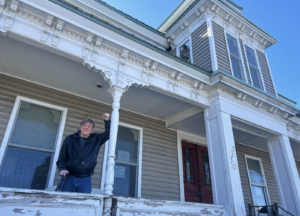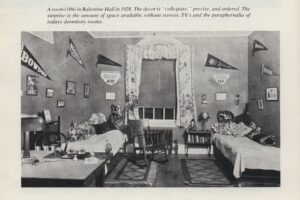
“How many of you believe you have rights?” a woman asked the crowd of students that had gathered on the University Mall. Many hands went up into the air.
“Every right that we stand upon, every right that we claim for ourselves is seeded on the foundation of a set of specific responsibilities. If we want to be able to claim a right for ourselves, then we have to be willing to take responsibility for creating a world where that right can be met, where it can exist,” Sherri Mitchell announced to the crowd.
Mitchell, a University of Maine alumna, a member of the Penobscot Nation and an environmental activist, charged students to assist in making a better change for our planet.
This was how EarthFest, a celebration of Earth Day at UMaine, began.
A large crowd of students, faculty and staff participated in the largest Earth Day celebration UMaine has ever seen. Throughout the course of the day, the event saw around 300 to 400 people, whom were all hoping for a change.
In addition to speakers like Mitchell, the event encompassed different aspects of Earth preservation, from free vegan food, to live music with Earth-friendly messages, to lots of recycling.
And yes, of course, the annual Naked Bike Ride.
For first-year students Olivia Pennington and Erin Butts, EarthFest placed an importance on Earth preservation.
“Having Earth Day … festivities out on the Mall is a great way of getting our entire campus community outside and together … [we’re] enjoying the earth. That sounds like such a cheesy way to put that, but it’s true,” Butts said.
Pennington agreed.
“If you enjoy the earth, then you can value it, then you can start to realize that it’s not going to be here forever if we keep treating it the way we are,” Pennington said. “I feel like it [EarthFest] could definitely have potential to bring a lot of change.”
Elias Pasquerillo, a fourth-year chemistry student and the president of College Democrats, had been planning EarthFest since the beginning of the fall semester with the help of the Green Team.
“[We wanted to] raise some awareness and have some fun … raise awareness both for the environment, but also for our groups … given our current climate,” Pasquerillo said. “We have an epidemic coming up …there is one [political] party in particular who is notorious for being climate change deniers … and it’s just frustrating. We just wanted to have something, to any extent, that would raise awareness.”
Pasquerillo and the rest of College Democrats tabled during the Earth Day festivities, promoting political education, especially with the upcoming presidential election in November. They offered fact sheets that included where each presidential candidate stood on issues, including their takes on science, energy and environmental issues.
“We’re just trying to reach out … given our current system, the best way to make change is to work within the system until we can change the system. That’s another part of our whole mission,” Pasquerillo said. “You have to celebrate the planet you live on, but you also have to recognize that there are forces at play who are trying to take this beautiful planet away from us.”
Numerous clubs with eco-friendly values tabled on the Mall during the event, and some tabled all week leading up to the Earth Day festivities, including the Marine Science Club.
In addition to Earth Day, this week was also Ocean Conservation Week, according to Emily Craig, a second-year marine science student and treasurer of the Marine Science Club.
“The whole idea about Ocean Conservation Week was … to have people be aware of the ocean … Not everybody [sic] thinks about their ocean in their everyday life, but the things that we do here in Orono, Maine … [despite being] landlocked, not on the coast, affects the ocean,” Craig said.
With Ocean Conservation Week, the Marine Science Club hoped to educate students on pressing ocean-related issues, including marine debris, ocean pollution and aquaculture. They also hosted activities that put an emphasis on why the ocean is important, featuring a “touch tank,” a segment Craig called “meet your neighbors on the Maine coast!”
“We live on Earth, which is obvious,” Craig said. “The Earth supplies us with so many [resources] … we can live here because of the oxygen and the food, and we just are really sh—y stewards of the Earth, basically. I think that it’s important that we take time to consider the Earth, consider the environment … [Earth Day] is a nice time to just pause from your everyday life and just really think about the Earth that you live on and the environment that you live in,” Craig added, continuing, “You get all wrapped up … in your own world … to have a day to just stop, and [realize] … ‘I live on Earth’.”
Divest UMaine, a club whose goal is to help UMaine divest completely from fossil fuels, spread their message during the timely celebrations.
“The environment is … an important thing, and Earth Day is kind of way to bring attention to environmental issues,” Andrew Nolan, a first-year environmental science student and member of Divest UMaine, said. “We came out, we handed out orange badges today … we took a big picture out on the library steps, to have as many kids [students] in it as possible, to show the board of trustees that we have support for divestment.”
Nathaniel Allen-Rahill, or “Nash” as fellow Divest UMaine members call him, is a second-year biological engineering student. He’s also the co-president of the club.
“The point of divestment is the opposite of investment. . . it’s to remove investments in. . . something that’s socially irresponsible. Fossil fuel divestment aims to remove investments in fossil fuels, not because we’re trying to destroy fossil fuel companies, but because we’re trying to say that we don’t stand with the humanitarian damage that fossil fuels are causing,” said Allen-Rahill said.
This week, Student Government released a survey on FirstClass to all students, asking whether or not they support full fossil fuel divestment. Allen-Rahill encourages peers to think about the damage fossil fuels cause, even if UMaine itself cannot see the direct damage.
“In the United States, we can afford to burn fossil fuels … and we don’t have to deal with the consequences. Most of us live in high-lying areas, and in the north, we don’t really have as many consequences … whereas in the global south, where people are less fortunate, they don’t have as much money and aren’t burning as many fossil fuels and yet they’re dealing with a lot of the damage … There are so many islands disappearing, nations disappearing,” Allen-Rahill said. “We don’t stand with that.”
If students want to join the Divest UMaine movement, Allen-Rahill says they should take Student Government’s survey, submit that they “highly support” divestment and wear the orange patch that symbolizes the movement on their clothes or backpacks.
While Earth Day highlights a multitude of pressing environmental issues, some think that this day should be no different than any other day.
“Earth Day is every day, to me,” Allen-Rahill said. “I think every day should be Earth Day.”











